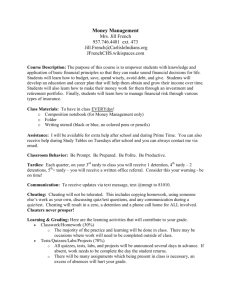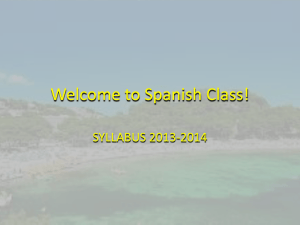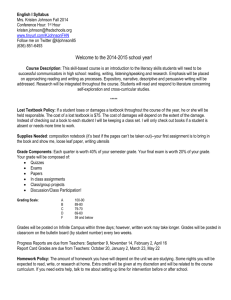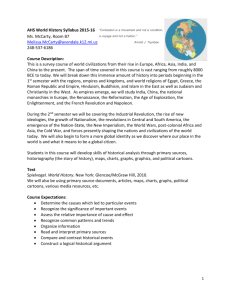10th Grade World History/Culture/ Geography
advertisement
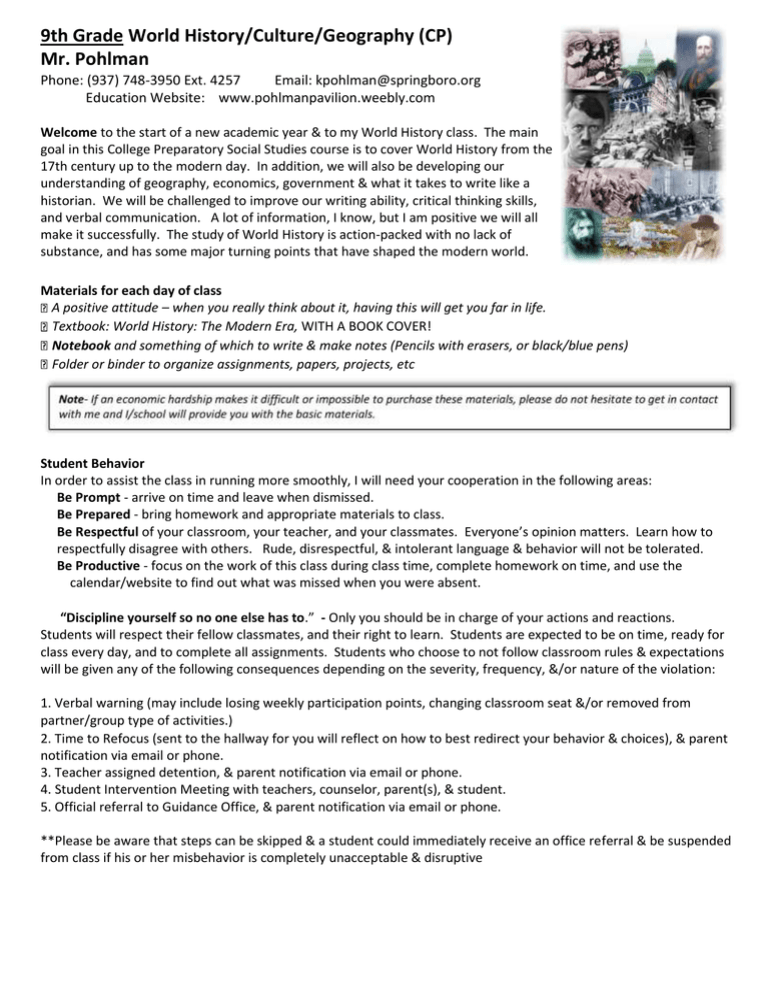
9th Grade World History/Culture/Geography (CP) Mr. Pohlman Phone: (937) 748-3950 Ext. 4257 Email: kpohlman@springboro.org Education Website: www.pohlmanpavilion.weebly.com Welcome to the start of a new academic year & to my World History class. The main goal in this College Preparatory Social Studies course is to cover World History from the 17th century up to the modern day. In addition, we will also be developing our understanding of geography, economics, government & what it takes to write like a historian. We will be challenged to improve our writing ability, critical thinking skills, and verbal communication. A lot of information, I know, but I am positive we will all make it successfully. The study of World History is action-packed with no lack of substance, and has some major turning points that have shaped the modern world. Materials for each day of class A positive attitude – when you really think about it, having this will get you far in life. Textbook: World History: The Modern Era, WITH A BOOK COVER! Notebook and something of which to write & make notes (Pencils with erasers, or black/blue pens) Folder or binder to organize assignments, papers, projects, etc Student Behavior In order to assist the class in running more smoothly, I will need your cooperation in the following areas: Be Prompt - arrive on time and leave when dismissed. Be Prepared - bring homework and appropriate materials to class. Be Respectful of your classroom, your teacher, and your classmates. Everyone’s opinion matters. Learn how to respectfully disagree with others. Rude, disrespectful, & intolerant language & behavior will not be tolerated. Be Productive - focus on the work of this class during class time, complete homework on time, and use the calendar/website to find out what was missed when you were absent. “Discipline yourself so no one else has to.” - Only you should be in charge of your actions and reactions. Students will respect their fellow classmates, and their right to learn. Students are expected to be on time, ready for class every day, and to complete all assignments. Students who choose to not follow classroom rules & expectations will be given any of the following consequences depending on the severity, frequency, &/or nature of the violation: 1. Verbal warning (may include losing weekly participation points, changing classroom seat &/or removed from partner/group type of activities.) 2. Time to Refocus (sent to the hallway for you will reflect on how to best redirect your behavior & choices), & parent notification via email or phone. 3. Teacher assigned detention, & parent notification via email or phone. 4. Student Intervention Meeting with teachers, counselor, parent(s), & student. 5. Official referral to Guidance Office, & parent notification via email or phone. **Please be aware that steps can be skipped & a student could immediately receive an office referral & be suspended from class if his or her misbehavior is completely unacceptable & disruptive Participating in Class Discussions I know that some are less comfortable than others about participating in class, so I will work to make the classroom environment as comfortable for everyone as possible. Your grade in the class discussion & participation will be based on how much progress you make throughout the semester. In other words, you will be assessed according to your own improvement, not based on how often you speak or what you say relative to other students in class. Discussion / Active Contributions The ability to contribute thoughtful ideas and questions to a discussion in a way that is respectful to yourself and to the views of others is a skill that you will be developing throughout academic and professional career. It is my aim for each young historian to be a master of this skill by the time you leave my classroom. Evaluation of Student Performance Students are expected to be present in class, be attentive, participate, complete classwork/homework on time, and take quizzes/tests with the best effort. Individually, you are all young adults; therefore I will be motivating you as such unless you make the case that you cannot handle this responsibility. I anticipate that a student may not bring their best effort to class each day (we all have our bad days) so it is up to you to determine how productive that day will be. Grade Scale On the account there are several course objectives, I will assess your performance on several measures. While the teacher reserves the right to determine the point value of all assignments, all tests, quizzes, projects, and writing prompts will be determined by dividing the number of points earned during a quarter by the number of points possible to decide the exact percentage grade. Points will be awarded for mid-term/final Exams, chapter/unit tests, quizzes, homework, in-class assignments, and student participation. Quizzes will be given during most chapters and may or may not be announced. Late Work Any work that is turned in past the assigned due date without Filing for an Extension (See Below) is counted as late and will not be accepted. Students will be reminded on a daily basis of when work is to be turned-in, and students should heed these reminders. File for an Extension If a student knows their work will be late (i.e. they have an after school activity, and a huge project due in a different class) students can notify the teacher by filing for an extension BEFORE the assignments’ due date. If the student thinks they should be granted an extension, they can do so by asking for and filling out the Extension Paperwork, available in class or online. My rational for a no late policy is to encourage each of you to be accountable for your own work while I also reinforce the importance of a deadline. Think of my class as a means to prepare you for after high school, which will include being accountable for very small and very large tasks. Paying bills on time, following up on a job interview, being prepared to submit your college application or FAFSA paperwork on time – all of these are future examples of accountability skills. When you are accountable and organized, you will be better-set to succeed for whatever career you aspire. Absences We all have days where we cannot make it to class. If this is the case, look at your class link on the PohlmanPavilion website under “What did I Miss” button. You are responsible for getting the assignments you miss - I will not track you down. Students who miss class due to an excused absence will be will have the same number of days that they were absent to make up the work. Tests and quizzes will be made up by appointment with the teacher Tardiness You are expected to be in your seat or heading towards your seat when the bell rings. Failing to do so will result in a tardy. For each quarter, penalties for tardiness will be treated in the following manner… 1st Tardy to Class – Warning 2nd Tardy to Class – Afternoon Detention 3rd Tardy to Class – Afternoon Detention 4th Tardy to Class – Administrative Detention Any subsequent tardiness – Administrative Detention Extra Credit At this time, there is no extra credit. Any extra credit will be offered on an as-need basis, which can be assigned by the teacher or when asked for by the student. Cheating Students are subject to disciplinary actions as stated in the school district’s student handbook. CONTENT TO BE COVERED: This World History class will cover the historical events, people, issues, & geography of our world as outlined in the Ohio State standards for 9th grade World History below: Topic: Historical Thinking and Skills Students apply skills by utilizing a variety of resources to construct theses and support or refute contentions made by others. Alternate explanations and historical events are analyzed and questions of historical inevitability are explored. Content Statements: 1. 2. 3. 4. Historical events provide opportunities to examine alternative courses of action. The use of primary and secondary sources of information includes an examination of the credibility of each source. Historians develop these and use evidence to support of refute positions. Historians analyze cause and effect, sequence, and correlation in historical events, including multiple causation and long-and short-term causal relations. Topic: Age of Enlightenment (1600-1800) The Age of Enlightenment developed from the Scientific Revolution of the 16th and 17th centuries. A new focus on reasoning was used to understand social, political and economic institutions. Content Statements: 5. The Scientific Revolution impacted religious, political, and cultural institutions by challenging how people viewed the world. 6. Enlightenment thinkers applied reason to discover natural laws guiding human nature in social, political and economic systems and institutions. 7. Enlightenment ideas challenged practices related to religious authority, absolute rule and mercantilism. Topic: The Age of Revolutions (1750-1914) The Age of Revolutions was a period of two world encompassing and interrelated developments: the democratic revolution and the industrial revolution. Both had political, economic, and social consequences on a global scale. Content Statements: 8. Enlightenment ideas on the relationship of the individual and the government influenced the American Revolution, French Revolution, and Latin American wars for independence. 9. Industrialization had social, political, and economic effects on Western Europe and the World. Topic: Imperialism (1800-1914) The industrialized nations embarked upon a competition for overseas empires that had profound implications for the entire world. This “new imperialism” focused on the underdeveloped world and led to the domination and exploitation of Asia, Africa, and Latin America. Content Statements: 10. Imperial expansion had political, economic and social roots. 11. Imperialism involved land acquisition, extraction of raw materials, spread of Western values and direct political control. 12. The consequences of imperialism were viewed differently by the colonizers and the colonized. Topic: Achievements and Crises (1900-1945) The first half of the 20th century was one of rapid technological advances. It was a period when the tensions between industrialized nations resulted in World War I and set the stage for World War II. While World War II transformed the balance of world power, it was the most destructive and costly war in terms of human casualties and material resources expended. Content Statements: 13. Advances in technology, communication, and transportation improved lives, but also had negative consequences. 14. The causes of World War I included militarism, imperialism, nationalism, and alliances. 15. The consequences of World War I and the worldwide depression set the stage for the Russian Revolution, the rise of totalitarianism, aggressive Axis expansion and the policy of appeasement which in turn led to World War II. 16. Oppression and discrimination resulted in the Armenian Genocide during World War I and the Holocaust, the statesponsored mass murder of Jews and other groups, during World War II. 17. World War II devastated most of Europe and Asia, led to the occupation of Eastern Europe and Japan, and began the atomic age. Topic: The Cold War (1945-1991) Conflicting political and economic ideologies after World War II resulted in the Cold War. The Cold War overlapped with the era of decolonization and national liberation. Content Statements: 18. The United States and the Soviet Union became superpowers and competed for global influence. 19. Treaties and agreements at the end of World War II changed national boundaries and created multinational organizations. 20. Religious diversity, the end of colonial rule and rising nationalism have led to regional conflicts in the Middle East. 21. Postwar global politics led to the rise of nationalist movements in Africa and Southeast Asia. 22. Political and social struggles have resulted in expanded rights and freedoms for women and indigenous peoples. Topic: Globalization (1991-Present) The global balance of power shifted with the end of the Cold War. Wars, territorial disputes, ethnic and cultural conflicts, acts of terrorism, advances in technology, expansion of human rights, and changes in the global economy present new challenges. Content Statements: 23. The break-up of the Soviet Union ended the Cold War and created challenges for its former allies, the former Soviet republics, Europe, the United States, and the non-aligned world. 24. Regional and ethnic conflicts in the post-Cold War era have resulted in acts of terrorism, genocide and ethnic cleansing. 25. Political and cultural groups have struggled to achieve self-governance and self-determination. 26. Emerging economic powers and improvements in technology have created a more interdependent global economy. 27. Proliferation of nuclear weapons has created a challenge to world peace. 28. The rapid increase of global population, coupled with an increase in life expectancy and mass migrations have created societal and governmental challenges. 29. Environmental concerns, impacted by population growth and heightened by international competition for the world’s energy supplies, have resulted in a new environmental consciousness and a movement for the sustainability of the world’s resources. 9th Grade World History/Culture/Geography (CP) – Mr. Pohlman PLEASE KEEP THE TOP SHEET FOR YOUR RECORDS & RETURN THIS FORM COMPLETED BY August 29th. ______________________________________________________ Student’s Name (Please Print) ______ Period I, ________________________, have read this course syllabus which summarizes everything that I need to know about my new World History class. I understand what is expected of me as a member of this learning community. I will do my best every day to use my strengths to contribute positively to my class. __________________________ _______________________ Student’s Signature Today’s date I, Mr. Pohlman, wrote this course syllabus as a way to help you, my student, understand what to expect in your new World History class. I understand what is expected of me as a teacher in this learning community. I will do my best every day to use my strengths in a positive way to help, lead, educate, & hopefully inspire you to do the best you possibly can in our World History class this year. PARENTS/GUARDIANS My name is Mr. Pohlman and your son/daughter is enrolled in my Modern World History class this year. I believe that education should be a cooperative effort between the teacher (me), the parent/guardian (you), and the student. Thus, it is essential that you are aware of the expectations outlined in this syllabus. Please read the attached document with your son/daughter and sign below, indicating that you are aware of its contents. Also, please include your contact information so I can reach you when need be. Print Name of Parent/ Guardian: _________________________________________________________ Signature of Parent/ Guardian: ______________________________________________________ Home Phone Number: _________________________________________________ Alternate Phone Number (Cell) ___________________________________________ Parent/Guardian Email: _________________________________________________ (OPTIONAL) Please feel free to write any concerns or comments you may have about my class &/or your child in the space below or on an attached sheet of paper. I will get in touch with you as soon as I can. Thank you.
